Hyundai Mobis Bundle
Who Buys from Hyundai Mobis?
In the dynamic automotive industry, understanding Hyundai Mobis SWOT Analysis is crucial. As the market shifts towards electric vehicles (EVs) and autonomous driving, knowing the company's customer demographics and target market is more vital than ever. The global EV market's projected growth to $450 billion in 2024 underscores the need for Hyundai Mobis to adapt and thrive.
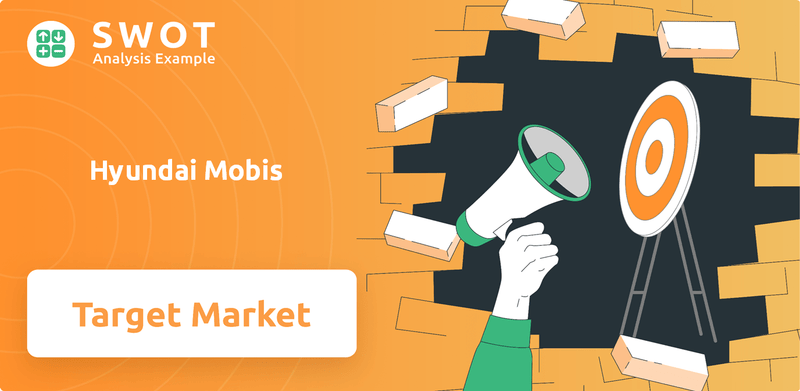
This analysis delves into the evolving landscape of Hyundai Mobis's customer base, exploring key aspects such as market segmentation and the Mobis customer profile. We'll uncover who Hyundai Mobis's main customers are, their location data, and how the company aims to diversify its target audience. This exploration sheds light on how Hyundai Mobis caters to its target market for auto parts and electric vehicle components, offering insights into their customer preferences and needs.
Who Are Hyundai Mobis’s Main Customers?
Understanding the customer demographics and target market for Hyundai Mobis is crucial for grasping its business strategy. As a major player in the automotive component manufacturing sector, Hyundai Mobis operates primarily in the business-to-business (B2B) market. Its main focus is supplying parts and modules to other automotive manufacturers, making its customer profile distinct from companies that sell directly to consumers.
The company's target market has evolved over time. Initially, Hyundai Mobis's primary customers were affiliated companies like Hyundai Motor Company, Kia Motors, and Genesis Motors. However, there has been a strategic shift to diversify its customer base, expanding beyond these traditional South Korean brands. This diversification is a key element of its growth strategy.
This expansion includes securing contracts with global automakers. Hyundai Mobis has successfully partnered with companies like General Motors, Mercedes-Benz, Skoda, and others. This shift indicates a focus on increasing its market share within the non-captive OEM segment. The company aims to increase its global automaker customer share in its auto component manufacturing sector from the current 10% to 40% by 2033.
Hyundai Mobis segments its customers based on their needs as automotive manufacturers. This includes the demand for advanced automotive modules, core components, after-sales service parts, and cutting-edge technologies. The company's customer base is segmented by the type of product they require, such as electric vehicle components or traditional internal combustion engine parts.
The company is actively widening its customer base beyond its traditional South Korean affiliates. It has successfully secured partnerships with global automakers. This includes companies like General Motors, Mercedes-Benz, and Volkswagen. This expansion is a key strategic goal for Hyundai Mobis.
The primary needs of Hyundai Mobis's customers revolve around the supply of automotive components. This includes advanced modules, core components, and after-sales service parts. The demand also extends to cutting-edge technologies like autonomous driving and electrification solutions. Understanding these needs is crucial for Hyundai Mobis to maintain its competitive edge.
Hyundai Mobis serves a global market. The company has a significant presence in North America, Europe, and Asia. Its customer location data reflects a diverse geographic footprint, with a strategic focus on expanding its reach in key automotive markets. This global presence supports its diversified customer base.
Hyundai Mobis is focused on increasing its non-captive sales, aiming for 40% of its total revenue by 2033, up from the current 10%. This strategic shift is evident in the growth of orders from outside the Hyundai Motor Group, which increased almost fivefold from 2020 through 2023. This diversification strategy is critical for long-term growth and resilience.
- The company's target market for auto parts includes a broad range of global automakers.
- Hyundai Mobis’s ideal customer profile includes manufacturers seeking advanced automotive components and technologies.
- The company's customer preferences and needs are centered on high-quality, reliable, and innovative products.
- For more details, you can check out the Marketing Strategy of Hyundai Mobis.
Hyundai Mobis SWOT Analysis
- Complete SWOT Breakdown
- Fully Customizable
- Editable in Excel & Word
- Professional Formatting
- Investor-Ready Format
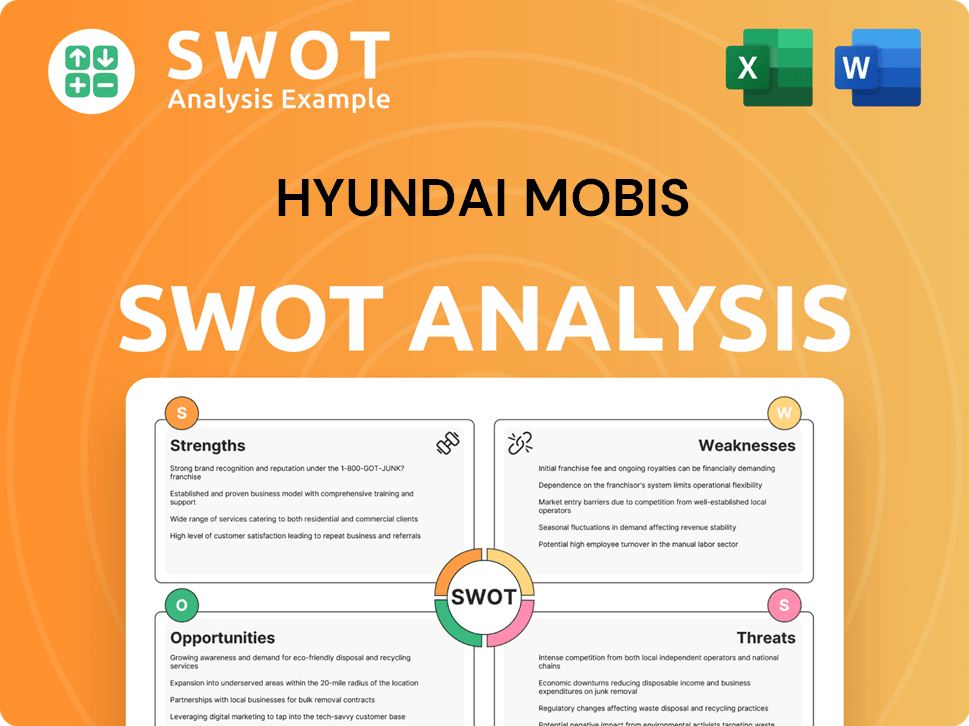
What Do Hyundai Mobis’s Customers Want?
Understanding the customer needs and preferences is crucial for Hyundai Mobis, a leading automotive parts supplier. The company's primary customers are global automakers, and their demands shape Hyundai Mobis's product development and strategic direction. This focus ensures that Hyundai Mobis remains competitive and meets the evolving needs of the automotive industry.
The key drivers for Hyundai Mobis's customers include advanced technology, reliability, and cost-effectiveness. Automakers seek high-quality automotive modules and components, such as chassis systems and cockpit modules, which are essential for vehicle assembly. Meeting these needs is critical for Hyundai Mobis to maintain its market position and foster long-term relationships with its customers.
Hyundai Mobis's ability to adapt to industry standards and technological advancements is paramount. The company's strategic investments and focus on innovation reflect its commitment to meeting the evolving needs of its customer base. This approach allows Hyundai Mobis to stay ahead of the competition and provide value-added solutions to its customers.
Customers prioritize advanced driver assistance systems (ADAS) and autonomous driving technologies. The global ADAS market was valued at $35.8 billion in 2024. Hyundai Mobis invests heavily in research and development to meet these demands.
Electrification systems, like battery system assemblies (BSA) and e-powertrain (e-PT) systems, are crucial. Hyundai Mobis invested over $2 billion in EV-related R&D in 2024. The company aims for a 15% global market share in EV parts by 2025.
Integrated infotainment and connectivity solutions are increasingly important. Customers expect connectivity features in 90% of new cars by 2025. Hyundai Mobis is developing tailored solutions to meet these demands.
Customers demand cost-effective and reliable components. Hyundai Mobis focuses on improving its business structure for profitability. The company's goal is to deliver high-quality products at competitive prices.
Hyundai Mobis addresses common pain points by securing leading technological competitiveness. The company tailors its offerings by developing pre-commercial technologies for local customers. This approach ensures that Hyundai Mobis remains adaptable and responsive to market changes.
Hyundai Mobis strengthens promotional activities tailored to specific markets, such as China. At Auto Shanghai 2025, the company will showcase 10 new technologies. This approach helps Hyundai Mobis cater to diverse customer needs.
Hyundai Mobis's focus on customer needs and preferences is evident in its strategic initiatives. The company aims to be a leader in Software-Defined Vehicles (SDVs), Human-Machine Interfaces (HMIs), EVs, and chassis safety components. This commitment to innovation and customer satisfaction is key to its success. For more insights, you can explore a Brief History of Hyundai Mobis.
Hyundai Mobis's target market, primarily global automakers, values advanced technology, reliability, cost-effectiveness, and adherence to industry standards. Understanding these preferences allows Hyundai Mobis to tailor its offerings and maintain a competitive edge.
- Advanced Technology: ADAS, autonomous driving, and connectivity solutions are highly sought after.
- Electrification: Demand for EV components, including BSAs and e-PT systems, is rapidly increasing.
- Reliability and Quality: Customers require high-quality automotive modules and components.
- Cost-Effectiveness: Competitive pricing and efficient solutions are essential.
- Market-Specific Solutions: Tailored technologies and promotional activities for different regions.
Hyundai Mobis PESTLE Analysis
- Covers All 6 PESTLE Categories
- No Research Needed – Save Hours of Work
- Built by Experts, Trusted by Consultants
- Instant Download, Ready to Use
- 100% Editable, Fully Customizable
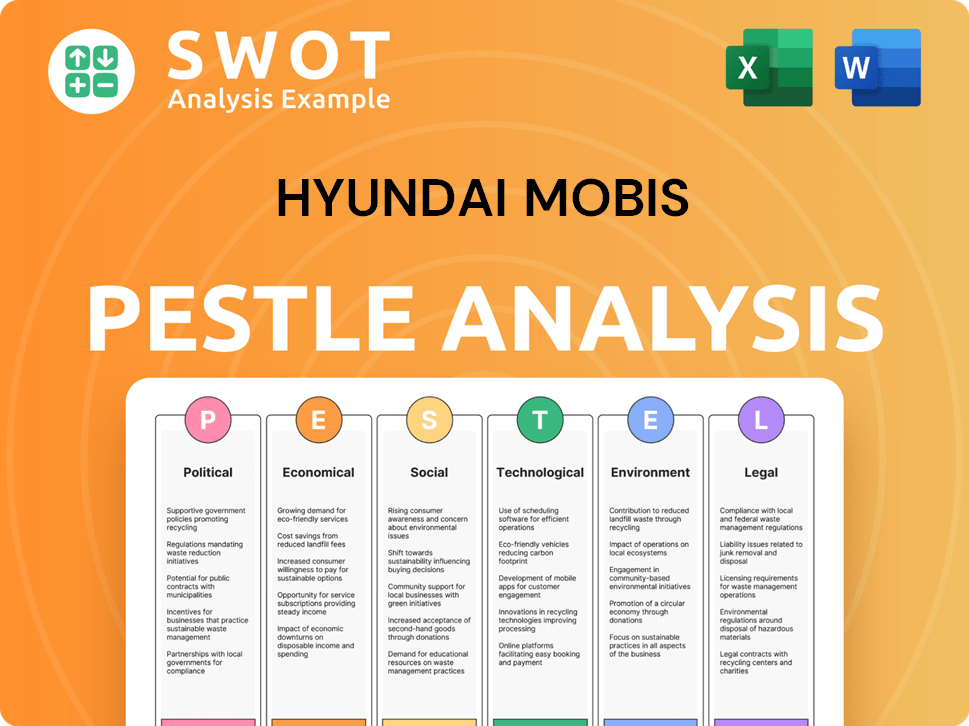
Where does Hyundai Mobis operate?
The geographical market presence of Hyundai Mobis is a key element of its strategic growth. The company, headquartered in Seoul, South Korea, has been actively expanding its global footprint. This expansion aims to diversify its customer base and reduce its reliance on affiliates, focusing on major markets like North America and Europe, alongside existing operations in China and India.
This expansion strategy is driven by a need to adapt to changing market dynamics and to capitalize on the increasing demand for automotive components worldwide. Hyundai Mobis's approach involves significant investments in production facilities and strategic partnerships to better serve its target markets. The company's goal is to increase its international sales, reflecting its commitment to becoming a truly global player in the automotive industry.
The company is strategically positioning itself in key automotive regions to meet growing demand and mitigate potential trade risks. This includes significant investments in production facilities and supply chains to support its global operations and achieve its ambitious sales targets.
In North America, Hyundai Mobis is increasing its production capacity to address potential trade protectionism and tariffs. The company has invested $1.3 billion in three plants in Georgia, aiming to supply the new assembly operations of Hyundai Motor Group near Savannah. This strategic move is part of a broader effort to strengthen its presence in the region and serve its Owners & Shareholders of Hyundai Mobis.
Hyundai Mobis anticipates an average annual sales growth of 30% in Europe through 2030, fueled by strong demand for its electrification components. A battery system assembly (BSA) plant is planned near the Volkswagen factory in Spain to facilitate prompt deliveries. This expansion is crucial for meeting the growing demand for electric vehicle components.
In China, Hyundai Mobis is intensifying its promotional activities, tailored to the local market, leveraging its technical centers in Shanghai and Yantai. The company participated in Auto Shanghai 2025, targeting $200 million in orders this year. This focused approach is designed to capture a larger share of the Chinese market.
Hyundai Mobis opened an integrated R&D center in India in April 2025, aiming to develop a global software hub. The company is also focused on expanding its electric powertrain (e-PT) systems tailored for compact EV markets in Europe and India by 2025. This strategic move is part of its global expansion strategy.
Hyundai Mobis emphasizes strategic localization of offerings and partnerships to succeed in diverse markets. This approach is crucial for achieving its goal of increasing international sales from 10% to 40% by 2033. The company's expansion strategy is designed to meet the evolving needs of its target market, including the demand for electric vehicle components.
- Focus on expanding production capacity in North America.
- Aggressive sales growth targets in Europe, driven by electrification.
- Tailored promotional activities in China to capture market share.
- Development of a global software hub in India.
Hyundai Mobis Business Model Canvas
- Complete 9-Block Business Model Canvas
- Effortlessly Communicate Your Business Strategy
- Investor-Ready BMC Format
- 100% Editable and Customizable
- Clear and Structured Layout
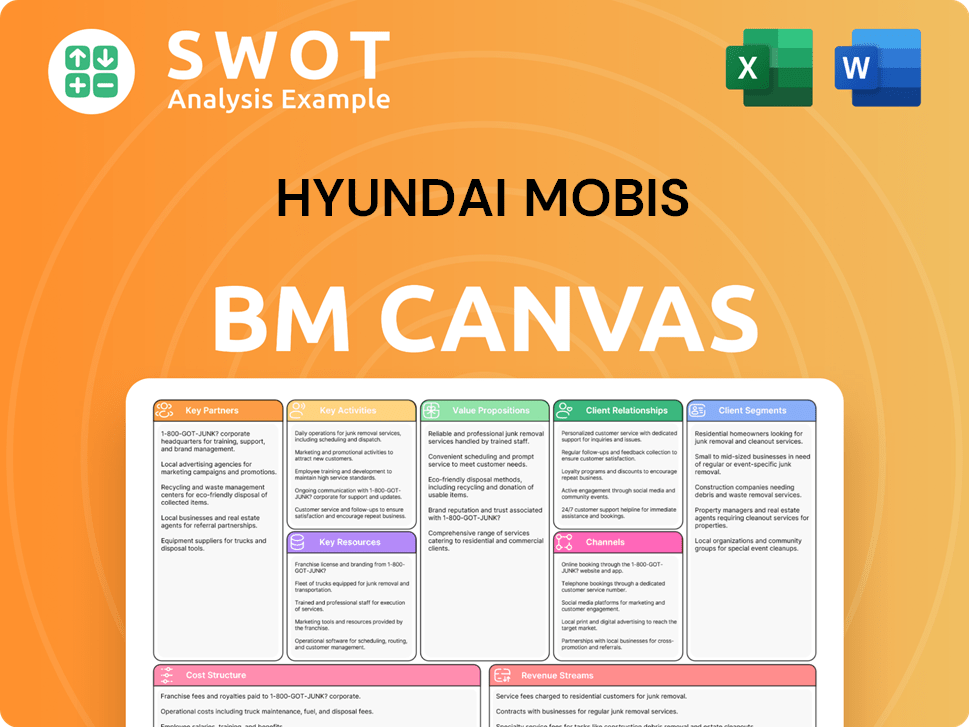
How Does Hyundai Mobis Win & Keep Customers?
Customer acquisition and retention are crucial for the success of any automotive parts and technology supplier. For Growth Strategy of Hyundai Mobis, these strategies involve a combination of technological innovation, strategic partnerships, and customer-centric approaches. The company aims to expand its global customer base beyond its traditional affiliates while strengthening its position as a leader in automotive technology.
A key focus for Hyundai Mobis is leveraging its advanced technologies to attract new customers. This includes showcasing innovations in areas such as advanced driver assistance systems (ADAS), autonomous driving solutions, and electrification components. The company actively participates in international events like CES 2025 and Auto Shanghai 2025 to gain new orders and demonstrate its capabilities to a global audience. These efforts are designed to appeal to a broad range of automakers, thereby expanding its market reach and customer base.
To retain its existing customers and foster new relationships, Hyundai Mobis emphasizes strategic partnerships and tailored solutions. They focus on ensuring product quality, reliability, and safety, particularly for genuine parts and accessories. These initiatives aim to enhance customer satisfaction and build long-term relationships, which are essential for sustained growth and market leadership. Investing in R&D is another key aspect of retaining customers, ensuring they have access to the latest and most advanced automotive technologies.
Hyundai Mobis actively promotes its advanced technologies, including ADAS, autonomous driving solutions, and electrification components, to attract new customers. Participation in events like CES 2025 and Auto Shanghai 2025 allows the company to showcase its innovations. For instance, they aim to secure $200 million in orders from China by participating in Auto Shanghai 2025.
Hyundai Mobis strengthens partnerships through large-scale module supply agreements with automakers like Volkswagen, Mercedes-Benz, and Stellantis. The company focuses on a customer-centric approach, ensuring product quality, reliability, and safety. They also launch campaigns like the 'Monsoon Awareness Campaign' and 'Diwali Contest' in India to elevate customer experience.
Hyundai Mobis invests heavily in R&D to maintain its technological edge and meet evolving market demands. In 2024, they invested $500 million in R&D for core components and over $2 billion in EV-related R&D. The company’s 'Move Improved' campaign, launched in January 2025, targets Millennials and Gen Z drivers.
Hyundai Mobis emphasizes a customer-centric approach by ensuring product quality, reliability, and safety. They launched campaigns like the 'Monsoon Awareness Campaign' and 'Diwali Contest' in India to highlight the benefits of genuine parts. These campaigns help elevate the customer experience and reinforce product quality.
Hyundai Mobis employs several strategies to acquire and retain customers, which include:
- Technological Innovation: Showcasing advanced technologies at international events like CES and Auto Shanghai.
- Strategic Partnerships: Forming module supply agreements with major automakers such as Volkswagen and Mercedes-Benz.
- Customer-Centric Campaigns: Launching campaigns like the 'Monsoon Awareness Campaign' and 'Diwali Contest' in India.
- R&D Investment: Investing heavily in R&D for core components and EV-related technologies.
- Targeted Marketing: Launching campaigns like 'Move Improved' targeting specific demographics like Millennials and Gen Z.
Hyundai Mobis Porter's Five Forces Analysis
- Covers All 5 Competitive Forces in Detail
- Structured for Consultants, Students, and Founders
- 100% Editable in Microsoft Word & Excel
- Instant Digital Download – Use Immediately
- Compatible with Mac & PC – Fully Unlocked
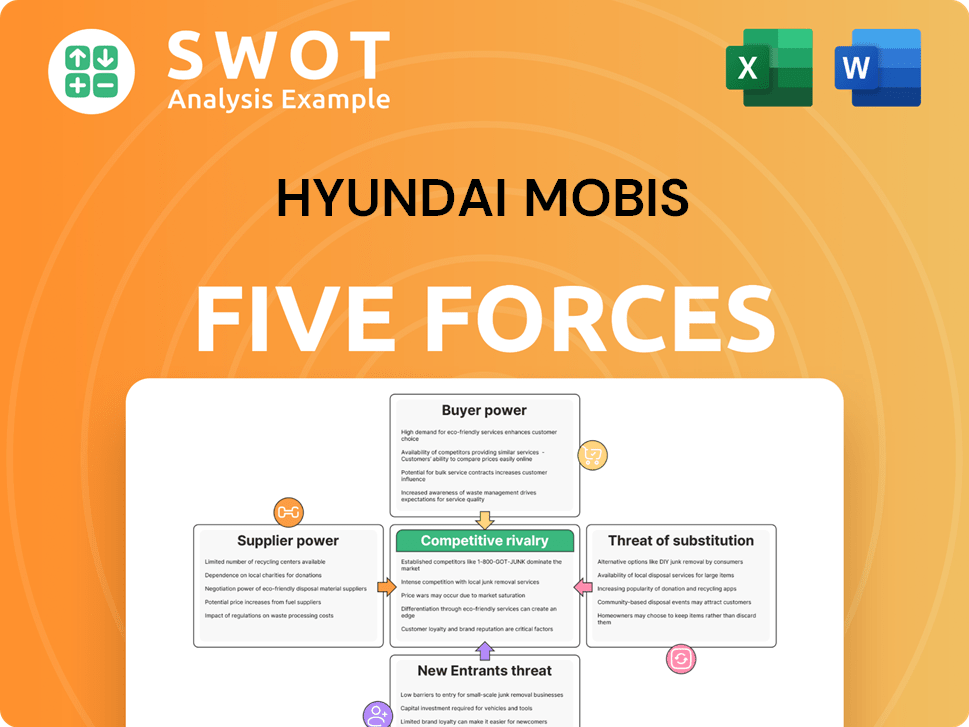
Related Blogs
- What are Mission Vision & Core Values of Hyundai Mobis Company?
- What is Competitive Landscape of Hyundai Mobis Company?
- What is Growth Strategy and Future Prospects of Hyundai Mobis Company?
- How Does Hyundai Mobis Company Work?
- What is Sales and Marketing Strategy of Hyundai Mobis Company?
- What is Brief History of Hyundai Mobis Company?
- Who Owns Hyundai Mobis Company?
Disclaimer
All information, articles, and product details provided on this website are for general informational and educational purposes only. We do not claim any ownership over, nor do we intend to infringe upon, any trademarks, copyrights, logos, brand names, or other intellectual property mentioned or depicted on this site. Such intellectual property remains the property of its respective owners, and any references here are made solely for identification or informational purposes, without implying any affiliation, endorsement, or partnership.
We make no representations or warranties, express or implied, regarding the accuracy, completeness, or suitability of any content or products presented. Nothing on this website should be construed as legal, tax, investment, financial, medical, or other professional advice. In addition, no part of this site—including articles or product references—constitutes a solicitation, recommendation, endorsement, advertisement, or offer to buy or sell any securities, franchises, or other financial instruments, particularly in jurisdictions where such activity would be unlawful.
All content is of a general nature and may not address the specific circumstances of any individual or entity. It is not a substitute for professional advice or services. Any actions you take based on the information provided here are strictly at your own risk. You accept full responsibility for any decisions or outcomes arising from your use of this website and agree to release us from any liability in connection with your use of, or reliance upon, the content or products found herein.